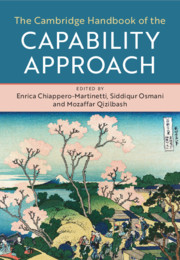Book contents
- The Cambridge Handbook of the Capability Approach
- The Cambridge Handbook of the Capability Approach
- Copyright page
- Dedication
- Contents
- Figures
- Tables
- Contributors
- Foreword
- Acknowledgements
- General Introduction
- Part I Historical Antecedents and Philosophical Debates
- Part II Methods, Measurement and Empirical Evidence
- Part III Issues in Public Policy
- Index
- References
General Introduction
Published online by Cambridge University Press: 11 November 2020
- The Cambridge Handbook of the Capability Approach
- The Cambridge Handbook of the Capability Approach
- Copyright page
- Dedication
- Contents
- Figures
- Tables
- Contributors
- Foreword
- Acknowledgements
- General Introduction
- Part I Historical Antecedents and Philosophical Debates
- Part II Methods, Measurement and Empirical Evidence
- Part III Issues in Public Policy
- Index
- References
Summary
We welcome readers to the Cambridge Handbook of the Capability Approach. We begin with some preliminary remarks about: (1) the state of capability research; (2) the basic concepts used in the approach; and (3) a brief explanation of the organization and structure of the Handbook.
Modern work on the ‘capability approach’ (or ‘capabilities approach’) dates from Amartya Sen’s 1979 Tanner Lecture on ‘Equality of What?’ which addressed a central question for egalitarians: what should egalitarians seek to equalize? In this context Sen suggested that ‘what is missing in all this … is some notion of “basic capabilities”: a person being able to do certain basic things’ (Sen 1982: 367).
- Type
- Chapter
- Information
- Publisher: Cambridge University PressPrint publication year: 2020

